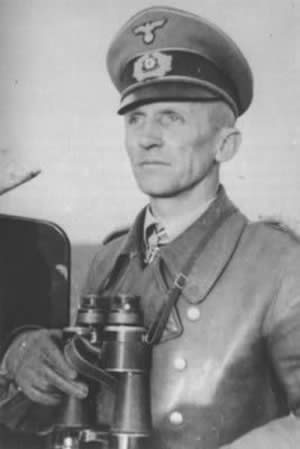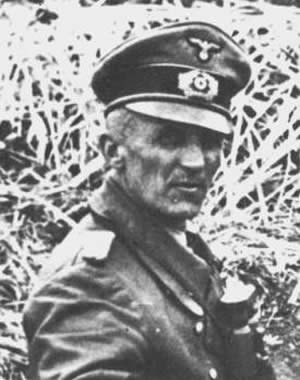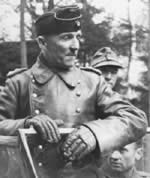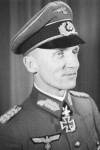Hasso von Manteuffel
Hasso von Manteuffel was born January 14, 1897 in Potsdam. He descended from a noble Prussian family; one of his forebears had even been a field marshal in the 19th century. At an early age, Von Manteuffel opted for an army career. He attended cadet school and joined a Hussar regiment in 1908.
During World War One, Von Manteuffel fought at the western front and managed to earn both the Eisernes Kreuz 2 as well as the EK 1 (Iron Cross). After the war, he was incorporated into the Reichswehr and after the seizure of power by Hitler (Bio Hitler) he was named commander of a motorized infantry battalion in 2. Panzerarmee. Thereafter, he served in various schools, familiarizing recruits with armored weaponry. He also was involved in motorizing the Wehrmacht. He was not actively involved in military campaigns until Hitler invaded the Soviet Union.
Shortly before the Germans invaded the Soviet Union, Von Manteuffel was placed in command of a mechanized infantry battalion of 7. Panzer-Division. Once Operation Barbarossa had started, this division struck deep into Russia and was involved in the capture of Smolensk and Vijazma. In recognition of his achievements, Von Manteuffel was promoted to colonel and was placed in command of a motorized infantry regiment of 7. Panzer-Division. After the frost had set in and the advance on Moscow was resumed, 7. Panzer was engaged in heavy fighting near Rzjev and Klin. Thereafter, Von Manteuffel’s regiment captured an important bridge across the Moscow-Volga canal. For this, he was awarded the Ritterkreuz (Knight’s Cross). He managed to hold this position against heavy Soviet counter-attacks and subsequently he managed to advance up to a mere 31 miles from Moscow but 7. Panzer was forced to retreat in the subsequent Soviet winter offensive. 7. Panzer fought hard and managed to prevent the Soviets from penetrating the front. As from July 1942, Von Manteuffel was given command of a motorized infantry brigade in 7. Panzer-Division until to his surprise he was transferred to Tunisia in North-Africa during the winter.
In Tunisia, Von Manteuffel was placed in command of a motorized infantry division. He was very successful with a number of counter-attacks, severing lines of communications behind the Allied front. He fell ill however and had to return to Germany to recuperate. Thus he escaped the surrender of the Afrika Korps, enabling him to continue playing an active role in the war.
After Von Manteuffel had recovered from his illness, he was placed in command of his 7. Panzer-Division on the eastern front. 7. Panzer fought fierce battles near Zjitomir and Von Manteuffel managed to inflict heavy losses on the Soviets by brilliant maneuvers. Despite the harsh conditions at the front, Von Manteuffel was adored by his men. In recognition of his successes in the fighting near Zjitomir, he was awarded the Eichenlaub (Oak leaves) to his Ritterkreuz. Subsequently, 7. Panzer, sometimes nicknamed the Gespenster Division (Phantom division) was involved in the massive tank battle near Korosten. The division managed to destroy several Soviet tank brigades. Von Manteuffel took part in the fighting himself a few times as tank commander.
In the spring of 1944, Von Manteuffel was put in command of the crack motorized infantry division Gross Deutschland. The division was almost immediately involved in heavy fighting to relieve Korsoen, (in the Cherkassy pocket) for instance. He and his division managed to prevent the Red Army from striking towards the Romanian oil fields more than once. In the summer of 1944, Von Manteuffel and his division a saw to it that the German garrison in Vilnjus in the northern part of the eastern front could be relieved, despite the overwhelming superiority of the Soviets.
September 1, 1944 saw Von Manteuffel promoted to General der Panzertruppen and he was placed in command of 5. Panzerarmee on the western front. In December, he was ordered to occupy the left flank of 6. Panzerarmee, commanded by Joseph (Sepp) Dietrich (Bio Dietrich). 5. Panzer came closest to its target: crossing the Meuse but was halted a few miles from Dinant near a bridge across the river and pushed back by the Allies.
Following the collapse of the Ardennes offensive, Von Manteuffel was transferred to the eastern front on March 2, 1945, taking command of 3. Panzerarmee of Heeresgruppe Weichsel commanded by Generaloberst Heinrici. This army group was tasked with halting the Soviet advance towards Berlin but was short of men and material. Heinrici realized it was futile to keep defending Berlin and refused to obey further orders from the O.K.H. This resulted in Heinrici being sacked. Therefore, Von Manteuffel was asked to take command over Army group Weichsel but he also realized that after the surrender of Berlin the war would be lost and so he refused. Subsequently Feldmarschall Wilhelm Keitel demanded Heinrici’s extradition. Von Manteuffel however proved his loyalty to Heinrici by having him guarded by his staff officers in order to prevent him from being arrested by the SS. Von Manteuffel had his own worries though: preventing his men from falling in the hands of the revengeful Soviets. A large scale retreat to the river Elbe was undertaken. After difficult negotiations with the British, Von Manteuffel managed to have 300,000 men surrender to the British on May 2, 1945.
After Von Manteuffel had been released in 1948, he became actively involved in West-German politics. He was a member of the Bundestag, representing the FDP from 1953 to 1957. In 1959, he was unexpectedly charged with a war crime. In January 1944, Von Manteuffel had brought a deserter before a court marshal and subsequently had him executed. In principle, this was no violation of the rules of war but nonetheless, he was sentenced to two years in prison. Following an intervention by Bundespräsident Heuss, the general was released four months later. After his release, Von Manteuffel occupied himself with giving advice on the production of American war movies. He passed away on September 24, 1978 during a trip through Austria.
Read more about the decorations of this person on https://www.tracesofwar.com" target=" _blank">TracesofWar.com
Images
Information
- Article by:
- Tom Notten
- Translated by:
- Arnold Palthe
- Published on:
- 19-01-2025
- Feedback?
- Send it!













